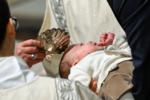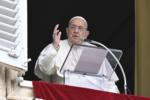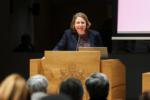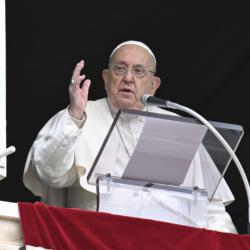Death penalty fuels 'poison' of revenge in society, pope says
VATICAN CITY (CNS) -- Capital punishment promotes a deadly attitude of revenge and denies the possibility of change in the lives of incarcerated people, Pope Francis said.
"The death penalty is in no way the solution to the violence that can strike innocent people," the pope wrote in the preface to a new book on prison chaplaincy.
Capital executions, "far from bringing justice, fuel a sense of revenge that becomes a dangerous poison for the body of our civil societies," the pope wrote. And rather than continue the cycle of violence, governments "should focus on allowing prisoners the opportunity to truly change their lives, rather than investing money and resources in their execution, as if they were human beings no longer worthy of living and to be disposed of."
The book featuring the pope's preface, titled "A Christian on Death Row," shares the experiences of Dale Recinella, a lay Catholic prison chaplain and licensed attorney who, along with his wife, has accompanied people on death row and in solitary confinement in Florida prisons since 1998. The book, published by the Vatican publishing house, was set to go on sale Aug. 27.
Pope Francis called Recinella's work a "living and passionate witness to God's school of infinite mercy," and he said it is a "great gift to the church and to society in the United States."
In light of the upcoming Holy Year 2025, the pope wrote, Catholics should "collectively call for the abolition of the death penalty."
"As the Extraordinary Jubilee of Mercy taught us, we must never think that there could be a sin, a mistake, or an action of ours that distances us permanently from the Lord. His heart has already been crucified for us," he wrote. "And God can only forgive us."
In 2018, the pope formally changed the Catechism of the Catholic Church to unambiguously oppose the death penalty. While the previous language allowed for the death penalty in extreme cases, the revised entry in the catechism calls the death penalty "inadmissible" and states that the church "works for determination for its abolition worldwide."
In his preface, Pope Francis said that God's infinite mercy toward each person "can also be scandalous," noting the many criticisms and rejections Recinella has faced for his prison ministry. "But is it not true that Jesus welcomed in His embrace a thief condemned to death?" the pope asked.
"Even the most heinous of our sins does not mar our identity in God's eyes: we remain His children, loved by Him, protected by Him and considered precious."
Pope Francis explained that in one loving gaze, "like that of Christ on the cross," incarcerated people "may find a new meaning in their lives and indeed, in their deaths."


















